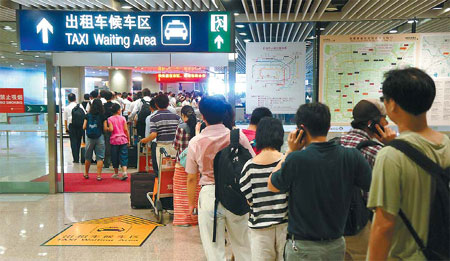
|
 |
|
Passengers wait in line to take taxis at the Beijing Capital International Airport on July 25, 2012. [Photo/China Daily] |
More frequent investigations and supervision will be conducted on the city's taxi industry in case drivers break regulations, according to the municipal government's micro blog on Sunday, a move that comes in response to frequent complaints from commuters.
People can call 010-6835-1150 or 010-6835-1570 to lodge a complaint, the authority said.
The Beijing Municipal Commission of Transport will also arrange for more taxis in key areas such as the airport and railway stations to ensure no one is stuck on the road.
With the downpours that have hit the capital since July 21, frequent complaints have arisen from commuters over taxis overcharging on rainy days, especially at the airport, railway stations, public transport hubs and downtown areas.
Li Yang, a teacher in Beijing, was charged 100 yuan ($15.70) from Sanyuanqiao to the Wangjing area on Friday, when it was raining, according to her micro blog. Normally the fare would be 15 yuan.
After Li and her husband tried to take a picture of the license plate to make a complaint later, the driver walked out of the taxi and punched her husband in the face. "I was very scared," she said.
However, there are also some drivers who voluntarily went behind the wheel to help out.
To assist air passengers whose flights were canceled and could not find a taxi, a group of drivers offered free rides back from the Beijing Capital International Airport on July 21 when the mayhem hit the capital.
Wang Lu, 28, from the Wangjing area, about 15 kilometers from the airport, organized 20 volunteers and picked up more than 500 passengers from the airport.
In response to public criticism and queries, some taxi drivers found themselves wronged.
According to Dou Keying, a taxi driver in the capital, driving on rainy days for hours without a break is extremely dangerous, and one moment of distraction might lead to a catastrophe.
"I guess those drivers who overcharge might find their efforts worth the price, since once the car is broken or damaged, they have to pay for all the expenses themselves, sometimes with a whole month's salary," said Dou.
However, as overcharging or refusing to take passengers is not allowed, people who encounter such circumstances should turn to the company or the commission of transport to protect their rights, he said.
Ji Jin contributed to this story.


 Washington to remain focused on Asia-Pacific
Washington to remain focused on Asia-Pacific RQFII target blue chips amid bear market
RQFII target blue chips amid bear market Australian recall for top two exporters
Australian recall for top two exporters China fears new car restrictions
China fears new car restrictions